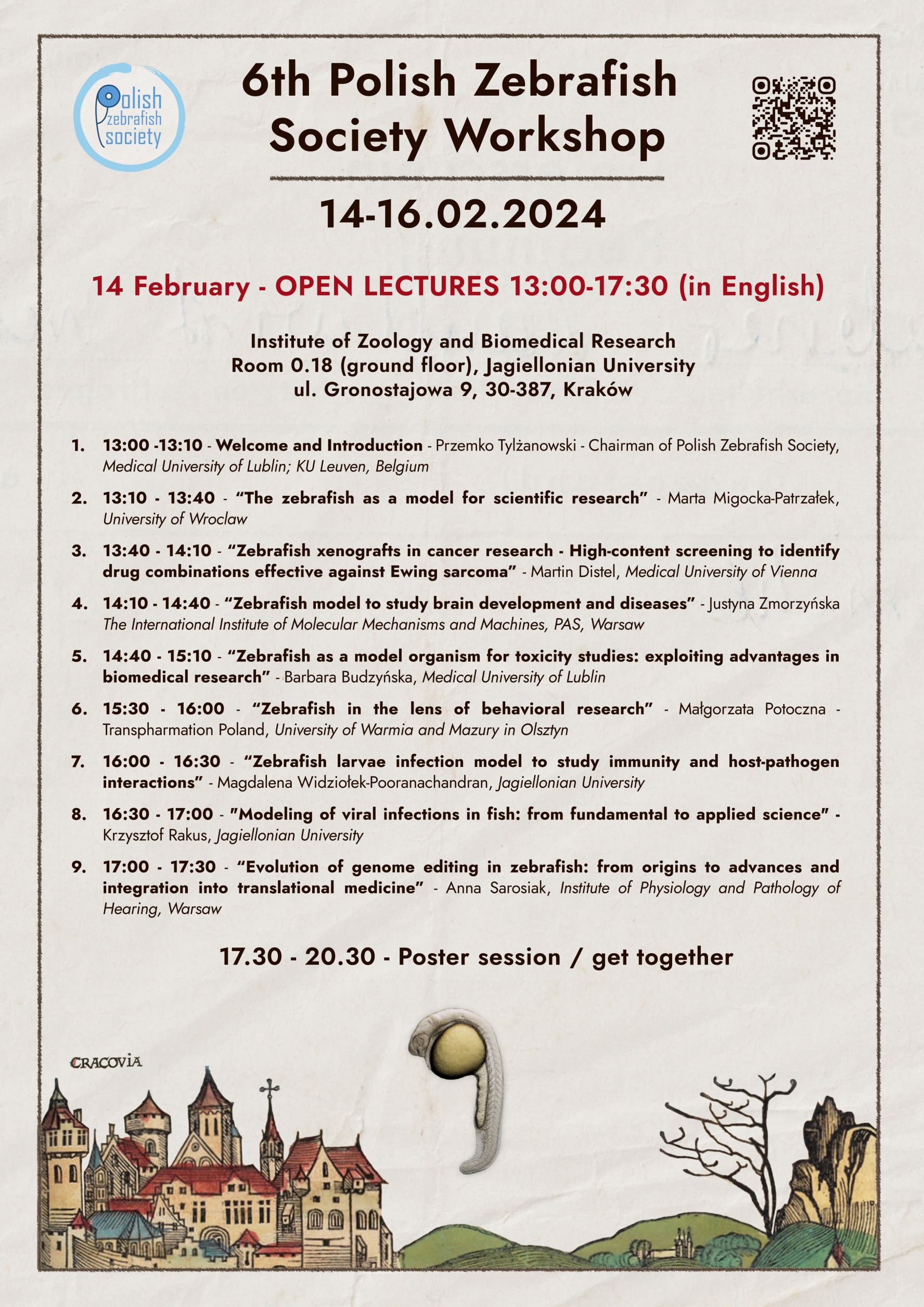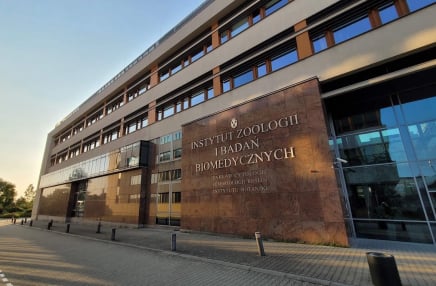
Thank you for your feedback in evaluation survey!!!
We carefully read them all and
we will use your suggestions during organization next events.
Here are some of your comments which make us especially happy:
“Excellent course! I learned a lot in wonderful atmosphere :)”
“PZS is the friendliest society that I have the pleasure of being a member of. I'm very impressed. The workshops exceeded my expectations. Thank you very much for the opportunity to participate, because it will certainly help us in our research. And I hope to share the results at our future meetings :-)”
“Great workshops, great people, and atmosphere. Keep that going!”
„A very good idea to integrate society of people working with zebrafish. It would be good to somehow continuate integration by regular meetings/conferences.”
“It was fun experience; I hope I will come back next year :)”
„You're the best :)”

The workshops will be held at the Institute of Zoology and Biomedical Research of the Jagiellonian University in Kraków (ul. Gronostajowa 9, 30-387 Kraków, Poland).
The training is intended for all scientists interested in research using zebrafish (Danio rerio) as a model organism.

DAY I (open to public)
13.00-17.30 LECTURES
13:00 -13:10 - "Welcome and Introduction" - Przemko Tylżanowski - Chairmen of Polish Zebrafish Society, Medical University of Lublin, KU Leuven, Belgium
13:10 - 13:40 - “The zebrafish as a model for scientific research” - Marta Migocka-Patrzałek -University of Wroclaw
13:40 - 14:10- "Zebrafish xenografts in cancer research - High-content screening to identify drug combinations effective against Ewing sarcoma"- Martin Distel- Medical University of Vienna
14:10 - 14:40 - "Zebrafish model to study brain development and diseases" – Justyna Zmorzyńska - The International Institute of Molecular Mechanisms and Machines
14:40 - 15:10 - “Zebrafish as a Model Organism for Toxicity Studies: Exploiting Advantages in Biomedical Research” - Barbara Budzyńska - Medical University of Lublin
~ 20 min break ~
15:30 - 16:00 -"Zebrafish in the lens of behavioral research"- Małgorzata Potoczna – Transpharmation Poland, University of Warmia and Mazury in Olsztyn
16:00 - 16:30 - "Zebrafish larvae infection model to study host-pathogen interactions" - Magdalena Widziołek-Pooranachandran - Jagiellonian University
16:30 - 17:00 - "Modeling of viral infections in fish:from fundamental to applied science" - Krzysztof Rakus-Jagiellonian University
17:00 - 17:30 "Evolution of genome editing in zebrafish: from origins to advances and integration into translational medicine" - Anna Sarosiak -Institute of Physiology and Pathology of Hearing
17.30 - 20.00 Poster session/ get together
DAY II
8.00-8.15 Registration and Welcome
8.15-10.15 Practicals - part I
10:15-10:30 Coffee break
10.30-12.30 Practicals -part II
12.30-14.00 Lunch & Discussion
14:00-16:00 Practicals -part III
16:00-16:15 Coffee break
16.15-18.15 Practicals -part IV
DAY III
9.00- 10.00 Practicals - part V
10.00-11.00 Practicals - part VI
11:00-11:15 Coffee break
11.15-12.15 Practicals - part VII
12.15-13.15 Practicals - part VIII
13.15-14.45 Lunch & Summary
| Time | Group I | Group II | Group III | Group IV |
|---|---|---|---|---|
| 08.15– 10.15 | Toxicity screening using zebrafish embryos (LiCl) - Part I (Natalia Kasica)
+ Dissection of organs from adult zebrafish, finclips and swabbing (Joanna Dybalska, Mikołaj Mazur) | Basics of imaging and sample preparation - BF/fluorescence (Piotr Podlasz, Anna Sarosiak) | Microinjections (basics)
(Przemko Tylzanowski, Tomasz Prajsnar) + Zebrafish xenograft model (Anna Boguszewska-Czubara) | Behaviour (Agnieszka Michalak, Małgorzata Potoczna)
+ Visit in the zebrafish facility (Dariusz Gajdziński) |
| 10.15- 10.30 | Short break | Short break | Short break | Short break |
| 10.30-12.30 | Behaviour (Agnieszka Michalak, Małgorzata Potoczna)
+ Visit in the zebrafish facility (Dariusz Gajdziński) | Toxicity screening using zebrafish embryos (LiCl) - Part I (Natalia Kasica)
+ Dissection of organs from adult zebrafish, finclips and swabbing (Joanna Dybalska, Mikołaj Mazur) | Basics of imaging and sample preparation - BF/fluorescence (Piotr Podlasz, Anna Sarosiak) | Microinjections (basics)
(Przemko Tylzanowski, Tomasz Prajsnar) + Zebrafish xenograft model (Anna Boguszewska-Czubara) |
| 12.30-14.00 | Lunch & Discussion | Lunch & Discussion | Lunch & Discussion | Lunch & Discussion |
| 14.00-16.00 | Microinjections (basics)
(Przemko Tylzanowski, Tomasz Prajsnar) + Zebrafish xenograft model (Anna Boguszewska-Czubara) | Behaviour (Agnieszka Michalak, Małgorzata Potoczna)
+ Visit in the zebrafish facility (Dariusz Gajdziński) | Toxicity screening using zebrafish embryos (LiCl) - Part I (Natalia Kasica)
+ Dissection of organs from adult zebrafish, finclips and swabbing (Joanna Dybalska, Mikołaj Mazur) | Basics of imaging and sample preparation - BF/fluorescence (Piotr Podlasz, Anna Sarosiak) |
| 16.00-16.15 | Short break | Short break | Short break | Short break |
| 16.15-18.15 | Basics of imaging and sample preparation - BF/fluorescence (Piotr Podlasz, Anna Sarosiak) | Microinjections (basics)
(Przemko Tylzanowski, Tomasz Prajsnar) + Zebrafish xenograft model (Anna Boguszewska-Czubara) | Behaviour (Agnieszka Michalak, Małgorzata Potoczna)
+ Visit in the zebrafish facility (Dariusz Gajdziński) | Toxicity screening using zebrafish embryos (LiCl) - Part I (Natalia Kasica)
+ Dissection of organs from adult zebrafish, finclips and swabbing (Joanna Dybalska, Mikołaj Mazur) |
| Time | Group I | Group II | Group III | Group IV |
|---|---|---|---|---|
| 9:00 - 10:00 | Toxicity screening using zebrafish embryos (LiCl) - Part II (Natalia Kasica) | Introduction to cell sorting (Katarzyna Kłak-Pomykała) | Visualisation of xenografts and transgenic zebrafish (confocal microscopy)
(Piotr Podlasz) | CRISPR/Cas9 design (Anna Sarosiak) personal laptop required! |
| 10:00 - 11:00 | CRISPR/Cas9 design (Anna Sarosiak) personal laptop required! | Toxicity screening using zebrafish embryos (LiCl) - Part II (Natalia Kasica) | Introduction to cell sorting (Katarzyna Kłak-Pomykała) | Visualisation of xenografts and transgenic zebrafish (confocal microscopy)
(Piotr Podlasz) |
| 11:00 - 11:15 | Short break | Short break | Short break | Short break |
| 11:15 - 12:15 | Visualisation of xenografts and transgenic zebrafish (confocal microscopy)
(Piotr Podlasz) | CRISPR/Cas9 design (Anna Sarosiak) personal laptop required! | Toxicity screening using zebrafish embryos (LiCl) - Part II (Natalia Kasica) | Introduction to cell sorting (Katarzyna Kłak-Pomykała) |
| 12:15 - 13:15 | Introduction to cell sorting (Katarzyna Kłak-Pomykała) | Visualisation of xenografts and transgenic zebrafish (confocal microscopy)
(Piotr Podlasz) | CRISPR/Cas9 design (Anna Sarosiak) personal laptop required! | Toxicity screening using zebrafish embryos (LiCl) - Part II (Natalia Kasica) |
| 13:15 - 14:45 | Lunch & Summary | Lunch & Summary | Lunch & Summary | Lunch & Summary |
We thank our generous sponsor
HTML Maker